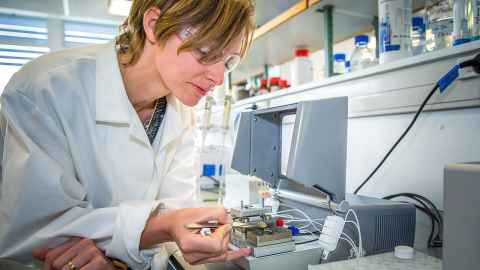Doctoral study in Chemical and Materials Engineering
Why study with us?
- The highest-ranked Engineering faculty in New Zealand and 107th in the world (QS World University Rankings by Subject, 2025)
- Opportunities to be supervised by experts across our key research areas, as well as those affiliated with the Research Centre for Surface and Materials Science, and more.
- Access to Postgraduate Research Student Support (PReSS) funding for research expenses.
Research opportunities
Pursuing a PhD at our University gives you access to a high-calibre research community – you may have the opportunity to publish papers, attend international conferences and develop your networks in academia and industry. The Department of Chemical and Materials Engineering is home to recognisable researchers in a variety of applicable fields – from food to biomaterials – so you’ll be able to take advantage of the best knowledge we have to offer.
Our areas of research expertise include:
- Energy, with research focused on thermal management using phase change energy storage, energy storage materials and batteries, solar energy and photovoltaics, organic ranking cycle, biofuels, waste to energy, hydrogen, energy harvesting materials, process modelling, control and optimisation
- Food engineering, focusing on developing novel food processing technologies for production of value added food products and ingredients, and the interaction of processing routes with product performance (Current research includes spray drying, freeze drying, evaporation, pasteurisation, extraction, non-thermal and thermal processing of food, simulation and control.)
- Health and wellbeing, designing and creating engineered materials and interfaces in the biomaterials space to better mimic, understand or control cells and tissues, with an interest in using the concepts of self-assembly to create dynamic, reconfigurable and functional materials (We further investigate the properties and functionalisation of biological polymers and nanostructures.)
- Innovative processes, including separation and purification technologies, bioprocessing, thermochemical and hydrothermal processing, catalysis, industry 4.0, and process modelling, optimisation and control
- Novel materials, focuses on the engineering and fundamental science of materials and surfaces (Our novel approaches in surface science and engineering include coatings, surface wear and corrosion resistance, porous materials, nanostructures, semiconductors, energy materials, magnetic materials, steel, and light metals.)
- Resource recovery, developing methodologies and technological solutions that enable the practical and cost-effective implementation of waste minimisation, recycling, and resource recovery (We develop world-leading innovative processes with sustainable and environmental applications by combining advanced chemical and biochemical reaction engineering and separation engineering.)
- Water, focuses on drinking water, wastewater treatment, process water treatment, adsorption, membrane filtration, persistent pollutants and process modelling, optimisation and control
Our people

Dr Jenny Malmström
Dr Jenny Malmström’s interdisciplinary research examines the interfaces between biology, chemistry and materials science. Her expertise includes the characterisation of material-biomolecule interactions and the influence of surface properties of cell adhesion onto substrates, with applications ranging from the creation of smart materials to the control of cellular behaviour. She was named a Rutherford Discovery Fellow in 2016 and awarded a Marsden Fast-Start grant for her research into better ways to grow stem cells. She is also a Principal Investigator of the MacDiarmid Institute for Advanced Materials and Nanotechnology.
More researchers in Chemical and Materials Engineering:
- Dr Andrea Kolb
- Associate Professor Ashton Partridge
- Professor Ashvin Thambyah
- Professor Brent Young
- Dr Filicia Wicaksana
- Dr Laura Domigan
- Associate Professor Mark Jones
- Professor Mark Taylor
- Professor Peng Cao
- Associate Professor Saeid Baroutian
- Associate Professor Shan Yi
- Dr Steven Matthews
- Associate Professor Wai Woo
- Dr Wei Yu
- Professor Wei Gao
Past research topics
- Phosphorus management and recovery via struvite crystallization in New Zealand | Supervised by Dr Wei Yu and Professor Brent Young
- Modelling, control and optimisation of geothermal organic Rankine Cycle power plants | Supervised by Dr Robert Kirkpatrick, Dr Wei Yu and Professor Brent Young
- Response of cryolite-based electrolytes and side-ledges to flexible potline power sifts at smelters | Supervised by Professor Mark Taylor and Dr Mark Dorreen
- TiO2 nanostructures for photocatalytic degradation of organic pollutants | Supervised by Professor Wei Gao and Dr Filicia Wicaksana
- Minimisation of ice adhesion to surfaces using nanoscale surface modifications | Supervised by Professor Wei Gao
- The regional susceptibility of the intervertebral disc to mechanically induced disruption and herniation | Supervised by Professor Neil Broom and Professor Ashvin Thambyah
- Effect of sintering conditions and composition on the fabrication and properties of electrically conductive b-Sialon-ZrN composites | Supervised by Associate Professor Mark Jones and Professor Wei Gao
Scholarships and awards
There are several scholarships you may be eligible for when you decide to pursue your PhD in Chemical and Materials Engineering, including the University of Auckland Doctoral Scholarships.
Help and advice
For general student enquiries, please contact a Student Hub.
If you would like to find out more about studying Chemical and Materials Engineering, you can contact a Postgraduate Adviser.